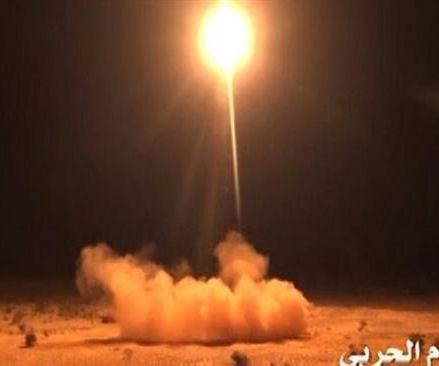 The current status of the Middle East is similar to that of the Balkans in the years before the World War I. Are we going to witness a Balkanization of the region — geopolitical fragmentation caused by other countries’ foreign policies? And what are the chances of an Iranian-Arab war or a Shiite-Sunni conflict that could lead to the redrawing of the Middle East map?
The current status of the Middle East is similar to that of the Balkans in the years before the World War I. Are we going to witness a Balkanization of the region — geopolitical fragmentation caused by other countries’ foreign policies? And what are the chances of an Iranian-Arab war or a Shiite-Sunni conflict that could lead to the redrawing of the Middle East map?
Saudi Crown Prince Mohammed bin Salman said a ballistic missile fired at Riyadh this month from Houthi militia-held territory in Yemen was supplied by Iran, and described it as “direct military aggression” and an “act of war.” The accusation was repeated by the Lebanese Prime Minister Saad Hariri in his resignation statement: “Iran controls the region and the decision-making in both Syria and Iraq. I want to tell Iran and its followers that it will lose in its interventions in the internal affairs of Arab countries.” He specifically blamed Iran for interference in the affairs of Lebanon.
Saudi rhetoric aimed at Iran has escalated in the past few weeks, and Foreign Minister Adel Al-Jubeir accused Tehran of being behind all evil acts in the region. “The Iranian terror continues to terrorize the innocent, kill children and violate international law, and every day it is clear that the Houthi militias are a terrorist tool to destroy Yemen,” he said. “The Kingdom reserves the right to respond to Iran at the right place and time.” Last week Saudi Arabia called on the UN to take measures against Iran to hold Tehran accountable for its conduct.
Events are moving fast. They could lead to a military confrontation, including the intensification of proxy wars, and a deepening of the Shiite-Sunni divide. The danger persists as long as the two superpowers, Russia and the US, stand on opposing sides of the spectrum on many regional issues, especially Iran. Recent comments from the Oval Office make it clear that the latest events have full US approval and conform with its expectations and policies.
The Iranian ballistic missile program is a key factor in Arab strategies and alliances. Many countries in the Middle East started heading east and west to purchase air defense missiles, such as the Russian S-300 and S-400 and the American Patriot and THAAD systems. Arab countries also started to think of producing their own military equipment by having offset projects with weapons manufacturers in China, Russia, Ukraine, South Africa, France, the UK, Germany, Brazil and the former Yugoslavia.
Saudi Arabia is also concerned about the influence of Iran in Lebanon through its proxy, Hezbollah, even more so since Riyadh believes Hezbollah operatives fired the most recent missile launched at the Kingdom from Yemen. “The Lebanese must all know these risks and work to fix matters before they reach the point of no return,” said the Saudi Minister for Arab Gulf Affairs Thamer Al-Sabhan.
Russia is keeping a close eye on the growing threat of military action against Iran — not a direct conflict, which is unlikely, but an extension of existing proxy wars.
Maria Dubovikova
This war of words may lead to a military clash in the Gulf or in Lebanon, further escalation in Yemen, Iraq and Syria, where Iran has a strong presence, and further proxy wars, unless the Americans take direct action against Iranian troops in Syria and Iraq. And that would lead to a dramatic escalation of tensions between regional and international powers already competing for influence in the Middle East.
Iran is a direct threat to the stability of the region, and US President Donald Trump has listed it as a major global threat. Tehran’s growing influence in Iraq, Syria, Lebanon, as well its activities in support of Houthi rebels in Yemen, pose a threat to the interests of the Arab world.
Action may be taken, including the military option, against the Iranian presence in the Levant. Escalation in Lebanon, the worst-case scenario, may result in a military conflict that would explode the region and drastically affect global stability because the players involved are so numerous and the stakes so high.
Nevertheless, the concerned sides understand that direct conflict would be a zero-sum game, and has to be avoided. The way to do so is by conducting proxy wars, but the cost of such wars on global stability and human life would also, inevitably, be too high.
Russia closely follows developments in the region because it has become directly involved. For Moscow, regional processes are critical. Historically, stability in Russia depends a lot on the climate in the region, and the Middle East is again one of its national interests. It has succeeded in building normal ties with all the players in the region, even those that are rivals with one other. Having good ties with Iran and Saudi Arabia, Russia has been proposing itself as a potential mediator in the conflict between Riyadh and Tehran, although the offer has not yet been taken up. Russia is worried about the possibility of escalation of already existing proxy wars and the emergence of new ones, especially in Lebanon.
In commenting on the dispute between Iran and Saudi Arabia, Russia has used diplomatic rhetoric, calculating all the possible risks and scenarios. A war in Lebanon would mean a drastic deterioration in regional stability, especially in Syria. The region needs stability, and political and diplomatic solutions for its disputes.
Article published in Arab News: http://www.arabnews.com/node/1194021
Photo credit: Mersad
